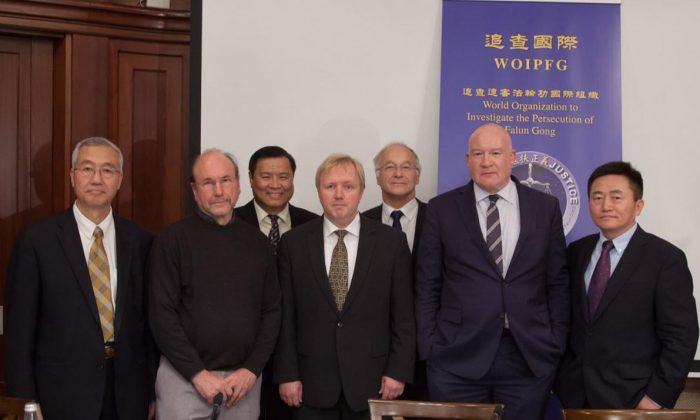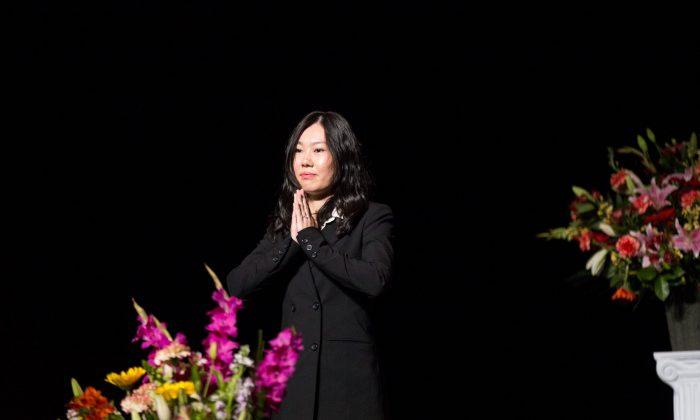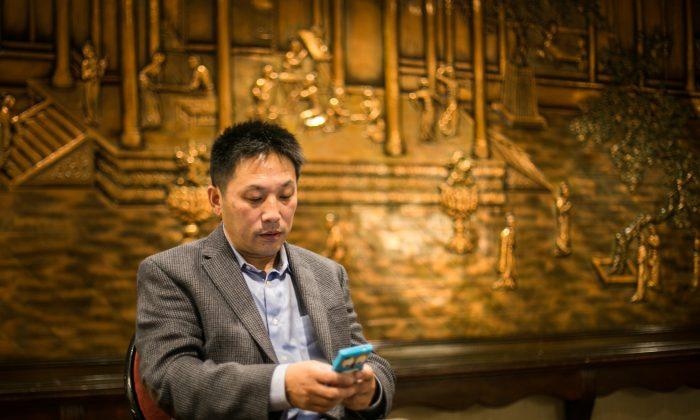It was 4 a.m. in Beijing when Google made the announcement that it would stop censoring its Chinese search engine. Hours later Chinese were arriving at its headquarters to lay wreaths of flowers, some crying over the decision.
“If we don’t have Google, it’s a real blow,” one young woman said to Australian broadcaster SBS.
Security guards said that an application for laying the flowers would first have to be submitted to the relevant regime departments. The flowers were removed, and the incident declared an “Illegal Flower Tribute.” The newly coined Chinese phrase (feifa xianhua) now garners 151,000 hits in Google (144,000 on Google.cn).
The news has been censored in some parts of the Chinese Internet, like Baidu’s “Paste Bar,” an online discussion community hosted by the popular search platform. The entry for “Illegal Flower Tribute” in Baidu’s Encyclopedia is also no longer available. Screenshots on Chinese Web sites show a previously burgeoning entry about the flower incident, but now Baidu says the entry doesn’t exist. Clicking to “create” the page says “This item is currently being created by another editor.”
Google said it had come under attack by hackers, presumably affiliated with the Chinese Communist Party (CCP), who were trying to access the e-mail addresses of Chinese human rights activists hosted on Gmail, Google’s email service. It said it would stop censoring its results on Google.cn, noting the possibility that its operations in China would finish as a result. Some overseas commentators have suggested that another possible reason for the change of posture was that Google’s business in China was not doing well anyway, and that adopting the freedom of speech discourse allows the company to make an honorable exit.
The flower laying, and subsequent removal, may be linked to incidents in recent Chinese history where flower tributes have closely followed expressions of political dissatisfaction. After the death of Hu Yaobang, a relatively popular and reform-minded CCP leader, thousands gathered to mourn, lay wreaths, and later launch protests. Two years later the protests set off by his death led to the Tiananmen Massacre of June 4, 1989.
“The kind of government [that removes flower tributes] makes people so angry their hair stands up,” one user wrote on a Hong Kong discussion forum.
The CCP’s response to Google’s move has not been conciliatory, with headlines in the English version of state mouthpiece Xinhua like “China stands firm on Internet security amid Google drama.” Foreign Ministry spokeswoman Jiang Yu said at a press conference that “China welcomes international Internet companies to conduct business within the country according to law,” referring to Internet censorship.
“If we don’t have Google, it’s a real blow,” one young woman said to Australian broadcaster SBS.
Security guards said that an application for laying the flowers would first have to be submitted to the relevant regime departments. The flowers were removed, and the incident declared an “Illegal Flower Tribute.” The newly coined Chinese phrase (feifa xianhua) now garners 151,000 hits in Google (144,000 on Google.cn).
The news has been censored in some parts of the Chinese Internet, like Baidu’s “Paste Bar,” an online discussion community hosted by the popular search platform. The entry for “Illegal Flower Tribute” in Baidu’s Encyclopedia is also no longer available. Screenshots on Chinese Web sites show a previously burgeoning entry about the flower incident, but now Baidu says the entry doesn’t exist. Clicking to “create” the page says “This item is currently being created by another editor.”
Google said it had come under attack by hackers, presumably affiliated with the Chinese Communist Party (CCP), who were trying to access the e-mail addresses of Chinese human rights activists hosted on Gmail, Google’s email service. It said it would stop censoring its results on Google.cn, noting the possibility that its operations in China would finish as a result. Some overseas commentators have suggested that another possible reason for the change of posture was that Google’s business in China was not doing well anyway, and that adopting the freedom of speech discourse allows the company to make an honorable exit.
The flower laying, and subsequent removal, may be linked to incidents in recent Chinese history where flower tributes have closely followed expressions of political dissatisfaction. After the death of Hu Yaobang, a relatively popular and reform-minded CCP leader, thousands gathered to mourn, lay wreaths, and later launch protests. Two years later the protests set off by his death led to the Tiananmen Massacre of June 4, 1989.
“The kind of government [that removes flower tributes] makes people so angry their hair stands up,” one user wrote on a Hong Kong discussion forum.
The CCP’s response to Google’s move has not been conciliatory, with headlines in the English version of state mouthpiece Xinhua like “China stands firm on Internet security amid Google drama.” Foreign Ministry spokeswoman Jiang Yu said at a press conference that “China welcomes international Internet companies to conduct business within the country according to law,” referring to Internet censorship.





Friends Read Free